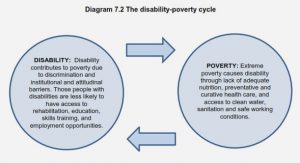Get Complete Project Material File(s) Now! »
The importance of ICT in organisations
Knowledge and Information Technology have never been more important in business than it is today, as was found by many research projects done during the past five to ten years (Senn, 1995; Schenk, 1998; Gallivan,1995; Black, 1997; Benamati, 1998; Cheney, 1990; Nielsen,1999). During the ‘information age’ (1980’s and 1990’s) businesses have come to recognise that information is a valuable resource separate from the technology that stores, retrieves and processes it. This has lead towards conscious management of information as a valuable corporate asset. At the close of the twentieth century the economies of the world started moving beyond the information age and into the ‘knowledge age’ (Schenk, 1998; Gallivan, 1995; Ambrose, 1998; Head, 1999). As Bergeron comments: “In this era of information on demand, knowledge and ideas have become commercially viable commodities” (Bergeron, 1999). The term “Knowledge management” has entered the corporate and research language and became a widely used term in the corporate world.
Organisations of the 21st century are expected to be increasingly dependent on knowledge and information technology, because the evolution into a knowledge society has increased the importance of the roles of information technology and computer personnel n providing organisational knowledge. As we approach the new millennium, it is University of Pretoria etd – Evans, A (2004) difficult to imagine a business today that does not in some way rely on IT as a foundation for its success (Trauth, 1993). A Massachusetts Institute of Technology study The management in the 1990s research Program stated that information technology is ubiquitous” while Benamati and Lederer (1998) calls it “the lifeblood of the organisation”. According to Lee (1995), computers today “not only provide the backbone of information processing for organisations, they are also changing the fundamental ways in which organisations operate”. On all levels IT has become a crucial tool – without it companies cannot advance. According to Benamati (1998) Information Technology has “increased in capability and plunged in cost” and new products emerge
rapidly. The corporate culture is also more aware and accepting of IT. This has put IT into a strategic role in many organisations.
Organizations have undergone significant changes over the past several decades. The changes in the Knowledge and Information Technology industry have made an impact on every sector of the business and corporate world. Very few professions have seen more changes as in the field of Information Systems and Information Technology (Lee et al., 1995; Benamati, 1998; Harvey et al, 1997)
CHAPTER 1 BACKGROUND TO THE STUDY
1.1 Preface
1.1.1 The importance of ICT in organisations
1.1.2 The changing IT career
1.1.3 Changing demands on IT professionals
1.1.4 A skills profile for IS/IT professionals
1.1.5 Previous research leading to this study
1.2 The IT/Business interface
1.2.1 The importance of relationships
1.2.2 The failure rate of IS/IT systems
1.2.3 Strategic alignment
1.2.4 Business-IT alignment is not enough anymore
1.2.5 Fusion
1.2.6 Management and fusio
1.3 Rationale and motivation for the research
1.4 Problem statement
1.5 Purpose of the study
1.6 Research design
1.6.1 Phase one: Background literature study
1.6.2 Phase two: Non-fusion
1.6.3 Phase 3: The role-players in creating fusion
1.7 Scope of the research
1.8 Actuality of the study
CHAPTER 2 LITERATURE STUDY
2.1 The business-IT relationship
2.1.1 Introduction
2.1.2 Reasons for the failure of IT projects
2.1.3 The relationship gap
2.1.4 Summary of the issues in the business-IT relatnship
2.1.5 Bridging the gap
2.2 Business- and systems analysis
2.2.1 Roles and responsibilities
2.2.2 Job titles
2.2.3 What is required of the business systems analyst?
2.3 Organisational Development (OD)
2.3.1 Introductio
2.3.2 What is organisational development (OD)
2.3.3 The move towards holistic OD
2.3.4 Who is responsible for OD?
2.3.5 The IT executive’s role in organisational development
2.3.6 New skills required of IT executives for their OD role
CHAPTER 3 RESEARCH METHODOLOGY AND RESEARCH METHODS
3.1 Research methodology
3.2 Research methods
3.2.1 Introduction
3.2.2 Literature study
3.2.3 Empirical research
3.2.4 Discussion of the research methods
3.2.5 Qualitative methods
CHAPTER 4 RESULTS: NON-FUSION IN ORGANISATIONS
4.1 Results from the literature study
4.2 Survey results
4.3 Interview results
CHAPTER 5 RESULTS: BUSINESS- AND SYSTEMS ANALYSIS
5.1 The relevance and format of the survey
5.2 Results of the content analysis
5.3 Survey results
CHAPTER 6 CREATING FUSION






